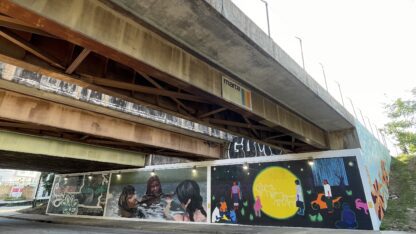Updated at 3:58 p.m.
Advocates for light rail on the Beltline are urging the City of Atlanta and its public transit system to move forward with development.
Around 40 people gathered at a Saturday rally organized by Beltline Rail Now, a group pushing to extend the Atlanta Streetcar and build light rail along the 22-mile loop.
Atlanta City Council President Doug Shipman spoke at the event on the Beltline in Reynoldstown.
“If we exclude parts of Atlanta from access, we simply continue to build inequality into the fabric of our city,” he said. “We cannot have equity without transit on this corridor.”
Devin Barrington-Ward, who is running for a spot on the Atlanta City Council, said during a speech at the rally that the lack of public transit makes living unaffordable in the Beltline, even if the district offers affordable housing.
“We will take them to task to make sure that they are prioritizing the use of our public money to benefit the public good, and there’s no greater benefit to the public good than Beltline rail,” he said, leading a chant.
“What do we want?” “Beltline rail!” “When do we want it?” “Now!”
In 2016, voters passed a half-penny sales tax to raise $2.5 billion for the Metro Atlanta Rapid Transit Authority to implement over 40 years as part of the More MARTA Atlanta program. The transit system approved plans in 2018 to construct light rail along the Beltline.
Mayor Andre Dickens recently told WABE’s Rose Scott that he supports light rail on the Beltline, but he needs to assess the costs of construction and operation, including the financial effects on surrounding businesses during construction.
“Am I in favor? Yes. Am I pushing for it? Yes,” he said. “But am I sober and fiscally responsible and someone who takes every job, every decision I make very seriously?”
He added that the state of Georgia does not fund MARTA.
In an interview after the rally, Shipman said the benefits that the rail would bring outweigh its costs.
“When you think about the benefits around equity, around affordability, around climate, I think those numbers absolutely make sense,” he said. “You make major investments up front, but those investments are going to pay dividends for 50 to 100 years. That’s five generations into the future.”
On WABE’s “Closer Look,” Georgia State Rep. Nikema Williams told Scott that she and Democratic U.S. Sens. Raphael Warnock and Jon Ossoff from Georgia will push for the light rail on the Beltline.
“I will continue to get money,” she said, adding that she will use funds obtained through a Community Project Funding request to promote transit along the path.
MARTA did not comment on criticisms from advocates for Beltline light rail.
Plans are underway for the Atlanta Streetcar East Extension, which would extend the Atlanta Streetcar from Jackson Street along the Beltline to Ponce City Market. In 2023, MARTA selected a designer for the project, estimating that it would cost $230 million and begin construction in 2025 for a 2028 service start date.
As for building light rail along the other portions of the Beltline, MARTA and the City of Atlanta have let those projects take a back seat.
Both bodies determined that the More MARTA program could not fund all of the capital projects originally planned, so MARTA adopted a “resequencing plan” that split projects into a prioritized Tier 1 and a deprioritized Tier 2, according to the findings of an independent audit published by the city on Monday.
The second deprioritized tier included five projects to build light rail along the northeast, southeast, southwest and west portions of the Beltline, as well as to extend the Atlanta Streetcar from Centennial Olympic Park to the Atlanta Beltline Westside Trail at Ralph David Abernathy Freeway.
According to the audit, the resequencing plan “has not been officially adopted by all governing bodies, as required,” so MARTA “is obliged to continue making progress on all 17 capital projects included in the 15th version of the sequencing plan,” including the deprioritized Tier 2 Beltline rail projects.
In a memorandum responding to the audit report draft, MARTA General Manager and CEO Collie Greenwood agreed that the resequencing plan and the “cumbersome, restrictive and ineffective” 2020 Intergovernmental Agreement (IGA) between MARTA and the city needed revision.
“It is important to note that MARTA has complied with the requirements of the IGA, and the program implementation timeline, initiating and advancing 8 of the 17 projects under the adopted sequencing plan as laid out in the agreement,” Greenwood stated. “Staffing levels have been ramped up appropriately to execute the work of this program.”
Matthew Rao, the chair of Beltline Rail Now, told WABE after the rally that now was an opportune time to act on Beltline rail projects, especially since Atlanta residents have been paying taxes toward the More MARTA program for years.
“Don’t hesitate. Be the transit mayor you said you wanted to be,” he said, addressing Dickens.
According to Rao, the group will meet with the mayor soon to talk about their demands.
“It’s our strength — our diversity, our unique mix of people in Atlanta, our universities, our trees and parks,” he said. “This is what makes Atlanta, Atlanta, and Beltline rail is about connecting all of that to everyone from anywhere.”









